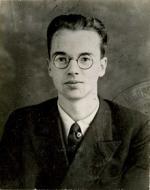Disable ads!
Klaus Fuchs
Emil Julius Klaus Fuchs (29 December 1911 – 28 January 1988) was a German-born British theoretical physicist and atomic spy who in 1950 was convicted of supplying information from the American, British, and Canadian Manhattan Project to the Soviet Union during and shortly after the Second World War. While at the Los Alamos National Laboratory, Fuchs was responsible for many significant theoretical calculations relating to the first nuclear weapons and later the early models of the hydrogen bomb. The son of a Lutheran pastor, Fuchs attended the University of Leipzig, where his father was a professor of theology, and became involved in student politics, joining the student branch of the Social Democratic Party of Germany (SPD), and the Reichsbanner Schwarz-Rot-Gold, the SPD's paramilitary organisation. He was expelled from the SPD in 1932, and joined the Communist Party of Germany (KPD). He went into hiding after the Reichstag fire, and fled to England, where he received his PhD from the University of Bristol under the supervision of Nevill Mott, and his DSc from the University of Edinburgh, where he worked as an assistant to Max Born. After the Second World War broke out in Europe, he was interned on the Isle of Man, and later in Canada. After he returned to Britain in 1941, he became an assistant to Rudolf Peierls, working on "Tube Alloys" – the British atomic bomb project. He began passing information on the project to the Soviet Union through Ruth Kuczynski, codenamed "Sonia", a German communist and a major in Soviet Military Intelligence who had worked with Richard Sorge's spy ring in the Far East. In 1943, Fuchs and Peierls went to Columbia University, in New York City, to work on the Manhattan Project. In August 1944 Fuchs joined the Theoretical Physics Division at the Los Alamos Laboratory, working under Hans Bethe. His chief area of expertise was the problem of implosion, necessary for the development of the plutonium bomb. After the war he worked at the Atomic Energy Research Establishment at Harwell as the head of the Theoretical Physics Division. In January 1950, Fuchs confessed that he was a spy. He was sentenced to fourteen years' imprisonment and stripped of his British citizenship. He was released in 1959, after serving nine years and emigrated to the German Democratic Republic (East Germany), where he was elected to the Academy of Sciences and the Socialist Unity Party of Germany (SED) central committee. He was later appointed deputy director of the Institute for Nuclear Research in Rossendorf, where he served until he retired in 1979.
 Read more on wikipedia.org Read more on wikipedia.org
 All quotes by Klaus Fuchs All quotes by Klaus Fuchs
 Edit Edit
|

|
|
|
|
|
Background photo by Giuliana
|